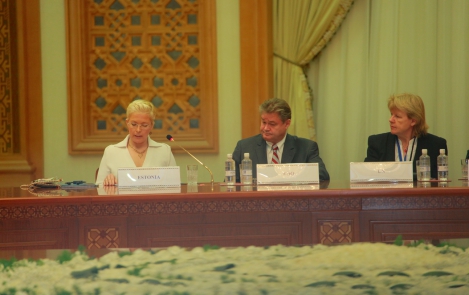-
Reset
+


Evelin Ilves: containing noncommunicable diseases requires responsibility from us all, including the producers
03.12.2013
"If abuse of alcohol and other lifestyle-related illnesses are one of the main causes of death, it is proof of a failed social policy. Let's think about our countries and citizens," Evelin Ilves, one of the opening speakers at the WHO European Ministerial Conference, said, calling for people, governments and producers to contain the spread of noncommunicable diseases as social illnesses. Noncommunicable diseases are the number one cause of death in the European Union member states.
Evelin Ilves stressed that she speaks in Ashgabat, at the WHO European Ministerial Conference on the Prevention and Control Noncommunicable Diseases in the Context of Health 2020, as "a doctor, a mother and a wife, who has been involved with containing the spread of noncommunicable diseases both in public as well as private for years".
Noncommunicable diseases are cardiovascular diseases, diabetes, malignant tumours and chronic respiratory diseases that are closely linked to unhealthy eating habits, lack of exercise, smoking and abuse of alcohol.
"These are so-called social communicable diseases that we cause ourselves - by our lifestyle. We pass them on to our friends and children and to people around us. Additionally, we must understand that those who produce and sell the products that cause these diseases also play a part," Evelin Ilves told the representatives of the 53 European region member states of WHO.
She recalled that a few years ago she asked her compatriots to avoid artificial trans fats and "many people shrugged in puzzlement and many representatives of our food industry found that I was unqualified and that I was jeopardising a successful native industry". However, eventually ordinary citizens began reading the labels in the shops, and several months later, Estonia's largest factory of confectionary products announced that they were stopping the use of trans fats in their products. Recently, the U.S. Food and Drug Administration also banned all use of artificial trans fats, because the link to cardiovascular diseases had been sufficiently proven.
"This issue, which was personal for me, demonstrates that in preventing noncommunicable diseases, we can initially face a wall of ignorance and incomprehension. To achieve success or even partial results, we must be persistent, steadfast, and have colleagues who think like us. Sometimes you also need to be ready to face fierce opposition. This way, we'll be strong enough to change people's habits and attitudes as well as the marketing principles of producers," Evelin Ilves said.
Poor diet, or more precisely eating the wrong things, is another serious health risk apart from smoking, alcohol abuse and too little exercise; and its effect will become apparent over time and people do not notice it immediately, she said and continued: "We could ask some producers if they are comfortable giving their own products to their children, such as a sausage that doesn't contain an ounce of meat."
In addition to the social responsibility of producers and the consumers' awareness in their daily shopping choices, Evelin Ilves stressed that it is especially vital for the food offered at kindergartens and schools to be healthy, as it is not chosen by the children or their parents.
"It is not simply about taste. Type 2 diabetes, once a rare disease prevalent in older adults, has become common and even worse; more and more children suffer from it," she noted. More and more adults and children are overweight or obese and with the increase of obesity, type 2 diabetes also rapidly spreads, even though it is not a communicable disease."
"What has changed in the past quarter of a century that has made obesity and obesity-related diseases such a huge problem?" Evelin Ilves asked.
Also, smoking and alcohol abuse are not communicable diseases spread by bacteria or viruses; they are diseases that spread socially, in connection with a social pressure and desire to fit in, Evelin Ilves said. Here, the private sector has an important role. For example, young people are the target group for new colourful drinks with a low alcohol content and these are marketed to young people.
According to Evelin Ilves, the health problems related to alcohol and tobacco are the result of our - national and international - economic policy.
"Saying that people drink "because they always have" is firstly, historically wrong, and secondly, implies ultimate helplessness, indicating that we cannot change our lives ourselves," she said.
"The demand for alcohol is linked to the supply and availability of alcohol. With well-funded advertising and branding, industries can transform the attitude of young people and their parents towards alcohol and tobacco, but also the opinions and convictions of politicians about whether it is possible to use evidence-based, responsible regulations to protect the most vital resource of the state - the people."
"As a European, I am glad that the conference will discuss the vision of a tobacco-free Europe. We will only achieve our aims if we can influence our environment so that a healthy lifestyle is a natural choice," Evelin Ilves said. "It is possible if the private sector realises its responsibility to people's health and if all of us realise our personal responsibility."
Evelin Ilves was invited to speak at the Ashgabat conference by the regional director of WHO, Zsuzsanna Jakab, when she visited Estonia in October.
Office of the President
Public Relations Department
Phone +372 631 6229



